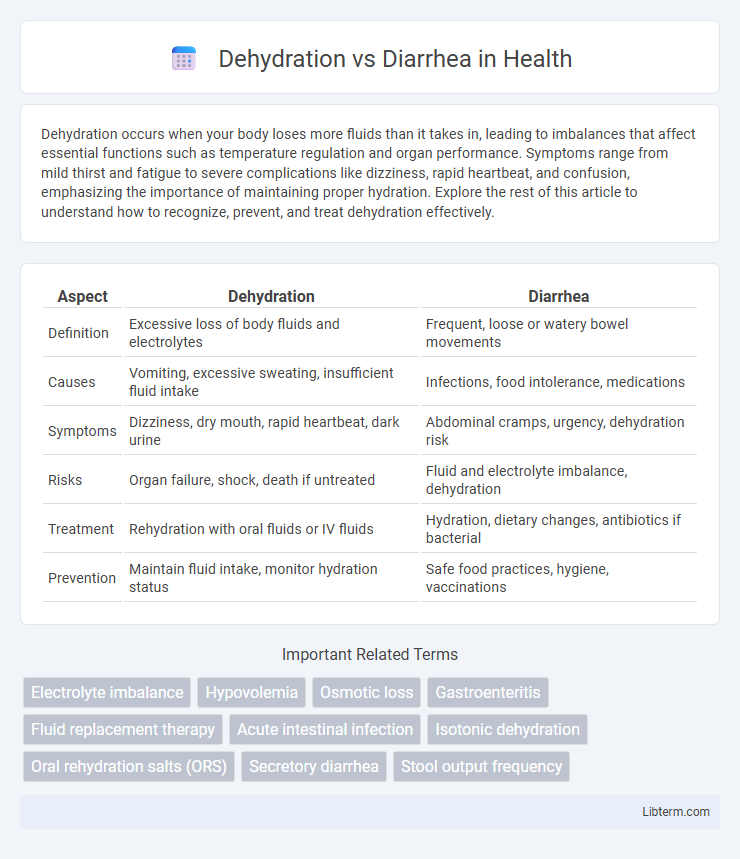Dehydration occurs when your body loses more fluids than it takes in, leading to imbalances that affect essential functions such as temperature regulation and organ performance. Symptoms range from mild thirst and fatigue to severe complications like dizziness, rapid heartbeat, and confusion, emphasizing the importance of maintaining proper hydration. Explore the rest of this article to understand how to recognize, prevent, and treat dehydration effectively.
Table of Comparison
| Aspect | Dehydration | Diarrhea |
|---|---|---|
| Definition | Excessive loss of body fluids and electrolytes | Frequent, loose or watery bowel movements |
| Causes | Vomiting, excessive sweating, insufficient fluid intake | Infections, food intolerance, medications |
| Symptoms | Dizziness, dry mouth, rapid heartbeat, dark urine | Abdominal cramps, urgency, dehydration risk |
| Risks | Organ failure, shock, death if untreated | Fluid and electrolyte imbalance, dehydration |
| Treatment | Rehydration with oral fluids or IV fluids | Hydration, dietary changes, antibiotics if bacterial |
| Prevention | Maintain fluid intake, monitor hydration status | Safe food practices, hygiene, vaccinations |
Understanding Dehydration: Causes and Symptoms
Dehydration occurs when the body loses more fluids than it takes in, often caused by excessive sweating, inadequate fluid intake, or illnesses like diarrhea, which accelerates fluid loss. Common symptoms of dehydration include dry mouth, increased thirst, dizziness, dark-colored urine, and fatigue. Recognizing these signs early is crucial to prevent severe complications, especially in vulnerable populations such as infants and the elderly.
What is Diarrhea? Key Signs and Triggers
Diarrhea is characterized by frequent, loose, or watery bowel movements caused by inflammation, infection, or digestive disorders. Key signs include abdominal cramps, urgency, bloating, and dehydration symptoms such as dry mouth and dark urine. Common triggers involve viral infections like norovirus, bacterial contamination, food intolerances, and certain medications such as antibiotics.
How Dehydration and Diarrhea Are Interconnected
Dehydration and diarrhea are closely interconnected as diarrhea causes excessive loss of fluids and electrolytes from the body, leading to dehydration. The severity of dehydration depends on the frequency and duration of diarrhea episodes, with prolonged or severe diarrhea increasing the risk of significant fluid depletion. Effective management of both conditions involves prompt rehydration and treatment of the underlying cause to prevent complications such as electrolyte imbalance and organ dysfunction.
Risk Factors: Who Is Most Vulnerable?
Infants, elderly adults, and individuals with weakened immune systems are most vulnerable to dehydration caused by diarrhea due to their limited ability to maintain fluid balance. Risk factors include prolonged diarrhea episodes, high fever, and insufficient fluid intake, which can rapidly lead to severe dehydration. Chronic illnesses such as diabetes or kidney disease increase susceptibility to complications from fluid loss during diarrheal infections.
Identifying Signs: Dehydration vs Diarrhea
Identifying signs of dehydration include dry mouth, excessive thirst, dark urine, and dizziness, while diarrhea is characterized by frequent, loose, or watery stools. Severe dehydration can occur rapidly with persistent diarrhea, leading to fatigue, rapid heartbeat, and reduced urine output. Monitoring these symptoms helps differentiate between mild diarrhea and dangerous dehydration requiring medical attention.
Short-term and Long-term Health Effects
Dehydration resulting from diarrhea causes immediate complications such as rapid weight loss, electrolyte imbalances, and potential kidney failure, especially in vulnerable populations like children and the elderly. Short-term health effects include fatigue, dizziness, and decreased cognitive function, while long-term consequences may involve chronic kidney disease and impaired growth in young children due to prolonged fluid and nutrient loss. Effective rehydration therapies and timely medical intervention are critical to preventing these adverse outcomes and promoting recovery.
Effective Prevention Strategies
Effective prevention strategies for dehydration caused by diarrhea emphasize maintaining adequate fluid intake, using oral rehydration solutions (ORS) rich in electrolytes, and ensuring hygienic food and water consumption to minimize infection risks. Early recognition of symptoms and prompt treatment with balanced hydration can significantly reduce complications and prevent severe fluid loss. Educating communities about proper handwashing, safe sanitation practices, and timely medical intervention remains crucial in controlling diarrhea-related dehydration.
Treatment Options for Dehydration and Diarrhea
Treating dehydration primarily involves oral rehydration solutions (ORS) that replenish fluids and electrolytes efficiently, while severe cases may require intravenous (IV) fluids to restore balance rapidly. Diarrhea management centers on maintaining hydration with ORS, using zinc supplementation to reduce duration and severity, and implementing probiotics to support gut health. Antibiotics are reserved for specific bacterial infections, and dietary adjustments, such as the BRAT diet (bananas, rice, applesauce, toast), help minimize gastrointestinal irritation during recovery.
When to Seek Medical Assistance
Seek medical assistance immediately if dehydration symptoms such as extreme thirst, dry mouth, dizziness, or decreased urination occur alongside diarrhea, especially in infants, elderly, or individuals with weakened immune systems. Persistent diarrhea lasting more than two days in adults or 24 hours in children, accompanied by blood in stool or high fever, warrants urgent medical evaluation. Prompt treatment can prevent severe complications like electrolyte imbalances, organ failure, and hospitalization.
Tips for Maintaining Optimal Hydration
Maintaining optimal hydration during diarrhea requires increasing fluid intake with oral rehydration solutions rich in electrolytes, such as sodium and potassium, to prevent dehydration. Consuming clear broths, herbal teas, and diluted fruit juices can help restore fluid balance while avoiding caffeinated or sugary beverages that may exacerbate fluid loss. Monitoring urine color for light yellow and drinking small, frequent sips supports effective hydration and recovery.
Dehydration Infographic

 libterm.com
libterm.com